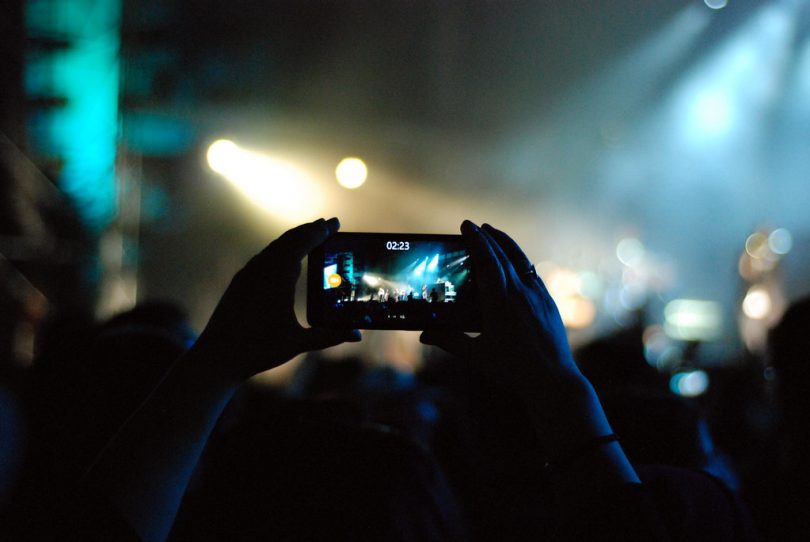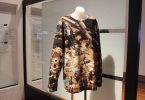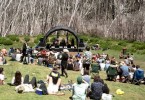The pandemic has shut down live music, but the soundtrack of our lives won’t be gone forever.
Gabriela Caeli Sumampow writes.
Cheering fans have been replaced with a mere device with comments and heart emojis popping up. A wide stage with a microphone in front and, in some cases, a band behind, has been replaced with a quiet bedroom — or wherever local artists are isolating in.
While some Australian musicians have suffered financial losses, these stem from being shut out from the possibilities of even holding one gig, let alone a whole tour.
There have also been fears that the absence of support could possibly lead to the absence of the soundtracks of our lives.
Live gigs are where musicians connect with new and existing fans, and they are left with a difficult medium to do this — live streams.
But the coronavirus didn’t kill Australian music. Australian musicians are still finding ways to release new music and connect with their fans. But when the pandemic is over, they hope they’ll be able to see the people behind the comments in their social media cheering for them in the audience of a post-COVID gig.
If it wasn’t for the pandemic, Californian-Melbournian artist Lauren Tarver would be touring across Australia as El Tee.
Lauren misses performing on stage. “There’s this other element where, you know, you can’t play with your band, you can’t still be in that community or that little group, that little family that you have playing music — and missing that,” she said.
Her single launch for Keep Walking was one of the many that joined the list of cancelled gigs, along with her tour. She had yet to book flights and venues, but the loss she experiences is emotional, rather than financial.
I was on the phone with Lauren on a Tuesday night, a few days away from her Instagram live-streamed single launch for Everything Is Fine. On her walk home, she told me the lockdown cost her the exposure “to a new audience in Sydney, Brisbane and other cities, the [merchandise] that could’ve sold”, and everything that doesn’t exactly translate to cash.
It holds “a different kind of influence of power to be able to be in front of a new audience and have those people that become potentially lifelong fans”.
COVID-19 also cancelled indie singer-songwriter Chitra’s debut EP tour. As someone who writes “significantly about emotion and relationships”, this pandemic an interesting time for her — a time when maintaining connections are hard.
The pandemic is a time to be gentle with creativity. “I have just in the last couple of weeks started writing more and getting back the excitement I would usually get about releasing and recording and having new material,” she said. She finds it important to “have supportive people around you and in your team to be empathetic towards that.”.
Chitra’s “blessing in disguise” was the fact that she hasn’t booked or paid for flights and accommodations. She doesn’t see her tour as being cancelled, and she plans on picking up where she left off with the tour as soon as possible.
Cancelling her debut EP tour was a defeat. But Chitra believes it’s different because everyone else is as much in a pandemic as she is. While artists have “a fear of sometimes being forgotten or lost in the mix”, she knows people will always be happy to see them, and her, return.
Eliza & The Delusionals had a lot on their plate, particularly in the United States. After having their songs “on high rotation on a national radio station”, and a tour with Silversun Pickups, they still had shows with Beabadoobee and PVRIS, along with a set at SXSW.
The moment their manager told them about SXSW’s possible cancellation sent their booking agents “scrambling for some sort of confirmation” on what the indie rock band could do, or what was happening.
Alas, SXSW was eventually cancelled, and Eliza & The Delusionals booked “the soonest flight home”. The band’s singer, Eliza Klatt, is now isolating in Queensland with Kurt – her partner and guitarist of the band.
After a decline “whilst fighting the twin battle of unlicensed online use and digital disruption”, ARIA’s wholesale figures mark 2019 as “the fifth straight year of growth for the Australian recorded music industry”.
But when the industry was growing consistently over the past few years, the pandemic hit.
While a majority of the music industry’s revenue is generated by online streaming, which in the new era of isolation has become a lifesaver, ARIA statistics show more than half of Australians attend live music in 2016.
Live music is the major source of income for most musicians. Live Performance Australia data shows that the number of people attending music performances, including small companies and venues, “easily top the 8 million mark, bigger than sport”.
A 2019 Report on the inquiry into the Australian music industry also shows live music ticket sales generating $991 million as of 2016.
Associate Professor Shane Homan, a music scholar at Monash University, said the music industry had “fallen off a bigger cliff because they rely so heavily obviously on the live music venue as a cornerstone of their incomes”.
“Obviously the business model is alluded to the fact that you have to be good at being live compared to other people, and I think Australians have a particular edge in that,” Professor Homan told me. “I noticed some Australian musicians have told me, when they go overseas, the fact that they slogged out across venues on almost a nightly basis here gives them a really good grounding to go overseas.”
RMIT Music Industry Lecturer Katharine Nelligan said she’s “read some reports where they’ve said that live music is actually the primary revenue stream now, whereas it used to be an advertisement so people would go and buy the album”.
She doesn’t think the importance of live music is to be underestimated — not only for artists but also for gig-goers who miss the experience.
Melbourne is “marketed as the live music capital of Australia in the world”, so the shutting down of this city’s live music industry, as Katharine says, “puts a big hole in the cultural identity of a place”.
The cancellation of gigs has hit the industry harder than ever, and artists like Chitra, El Tee and Eliza & The Delusionals rely on online live streams to continue bringing their music across the country and the world.
The afternoons of March 21 & 22 had Australian music lovers hooked on their devices. From one artist profile to another, they tuned in to Melbourne’s first Instagram Live music festival.
It was the exciting first week of Isol-Aid. Chitra, El Tee and Eliza & The Delusionals were among the 74 artists live streaming in their Instagram profiles, attracting new fans and social media followers.
Eliza & The Delusionals’ live streams with Isol-Aid were “probably some of the biggest, most-viewed ones” they’ve done.
The festival has reminded Chitra about her love of performing. She was left with hope for coming back on stage, and “a reminder that it isn’t the end to live music and no matter what situation, musicians will find a way to connect with people the way they know how”.
Lauren was grateful for the new fans she attracted, and the amount of merchandise that was sold. But she feels that payment for artists in the festival is “not really built-in”.
The festival encourages its audience to donate to Support Act, Australia’s only non-profit organisation that provides musicians and music industry workers facing physical or mental health issues, and financial hardship.
Support Act has been around since the late 90s, but not many people knew about them. The organisation gained its popularity after the pandemic, and Katharine says this shows that “the industry is in big trouble financially, and even from a mental health perspective.”
Mental health has always been a concern in the Australian Music Industry, but it took COVID-19 for the Federal Government to give $10 million to Support Act. “It’s just interesting to note that last year, with this royal commission, there was an acknowledgement that the music industry people have mental health issues,” she said.
Professor Homan believes mental health is an aspect that “needs to be studied in more detail”. Whether it’s a loss of income, paperwork for JobKeeper and JobSeeker, the lack of regular contact with friends, family or colleagues, there are musicians going through several things at once.
Adding up to musicians’ financial burdens is the difficulty of receiving the JobKeeper payment. “If they’ve got an ABN, they can apply for JobKeeper and nominate their sole trader business as the business. But if they don’t have that, and they’re working as a contract-based musician in another format, then they fall through the cracks pretty much,” Katharine said.
Professor Homan said musicians are in “a strange parallel universe at the moment where they’re called an artist, but other forms of creative industries have got assistance or found it easy to go on JobKeeper”. It’s harder for sole trader musicians to prove their losses to the Federal Government when applying for the JobKeeper payment.
Everything is still up in the air, but he doesn’t imagine it “being 3 to 4 stages until you’re back to a fully functioning music venue”.
The Australian live music industry was one of the first to be shut down by the coronavirus restrictions, but it’ll probably be one of the last to be brought back.
The big question about when artists can get back on stage eventually depends on how long it will take for venues to feel confident in putting music back on.
After Isol-Aid, Lauren returns to her Instagram profile on the night of 22 May to launch her newest single, Everything Is Fine.
“This is the single. It’s called ‘Everything Is Fine’, and… everything is fine,” she said, with the sound of her guitar being strummed in the background, introducing her long-awaited song towards the end of her live stream — after entertaining her audience with her music and quirky Instagram filters.
As a gig-goer and performer, Lauren misses live gigs. It’s “a whole other element that is engaging in its own way”, and she misses that emotional experience. But she’s not giving up. Her plan of recovery is “to keep on going, keep on releasing music” as planned.
“We’ve just been flexible where we can with the support of people that I work with, so my team is also flexible and really understanding with the need to sometimes make plans that need to be changed,” she said.
When the virus is gone, she’d celebrate at a gig booked in a heartbeat.
For Chitra, she plans to “keep writing and keep finding ways to play whether it’s virtually or physically”. It’s important to “support people and find new ways to do what we do and adapt how we can”.
She’ll also tour, despite her uncertainties about it being “different due to so many factors changing such as money, venue dates and other people’s circumstances”. Either way, she aims to “keep on making music and playing it” to the degree she can.
Things are “looking positive” in Queensland, but for Eliza & The Delusionals — as they work on applying for grants — things are still up in the air. “We’re just gonna do our best, and when we’re allowed to do things we’ll do them. Hopefully get straight back onto touring and hopefully, that’ll help us financially as well,” Eliza said.
“There’s definitely some opportunities that have now had to be cancelled and maybe people won’t be able to afford to bring them back up again,” she said, “It’s not just us, it’s everyone that’s being affected, so I think most things are just being put on hold until they can happen, so I’m not really too worried about it.”
Eliza knows the pandemic isn’t anyone’s fault. It is what it is, so she believes the opportunities she missed will come up in the future when everything is back to normal.
The experience of online live music will never replace the collective experience of being “in a crowdy, sweaty, small venue”, as Professor Homan puts it. Live-streamed initiatives like Isol-Aid and the amount of support for musicians shines a ray of hope on local artists and audiences.
The Australian music industry may be bleeding now, but it’s not dead. Because live music will be alive once again.
Featured Image:
“Music Fans Film Concert Show with Smart Phones” by MyStockPhotos is marked under CC0 1.0. To view the terms, visit https://creativecommons.org/licenses/cc0/1.0/








[…] Read the full story here. […]